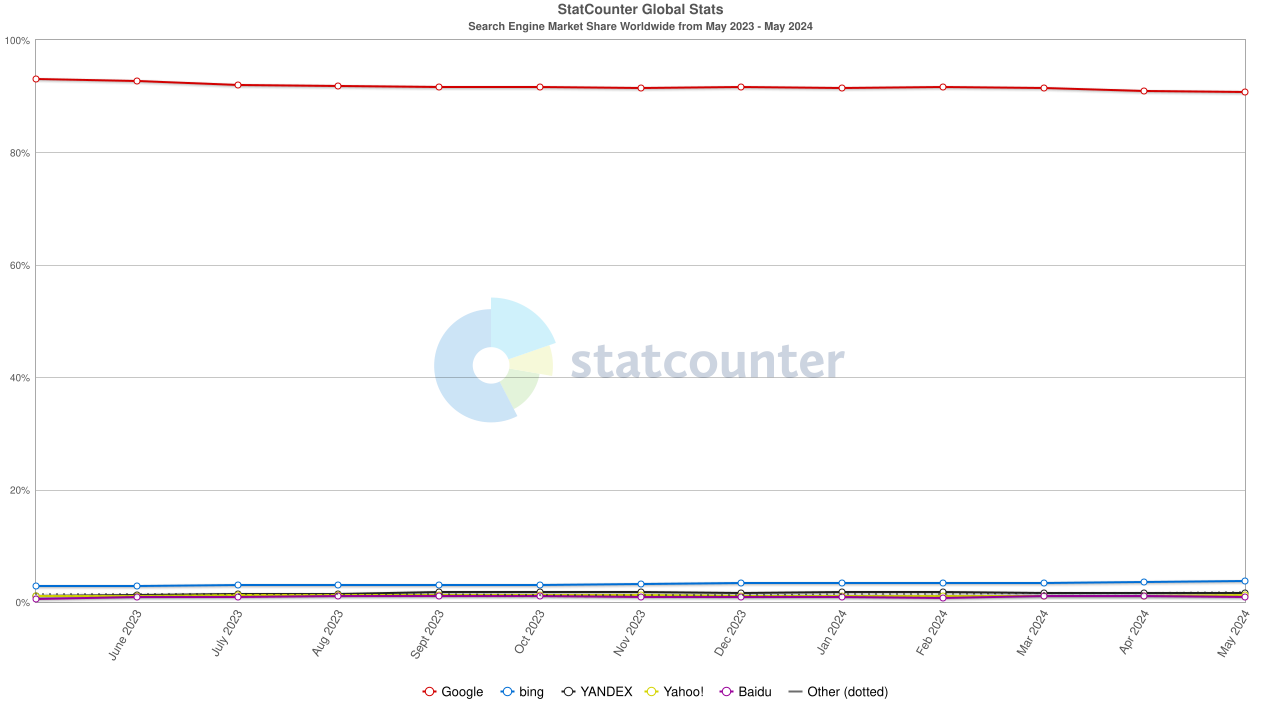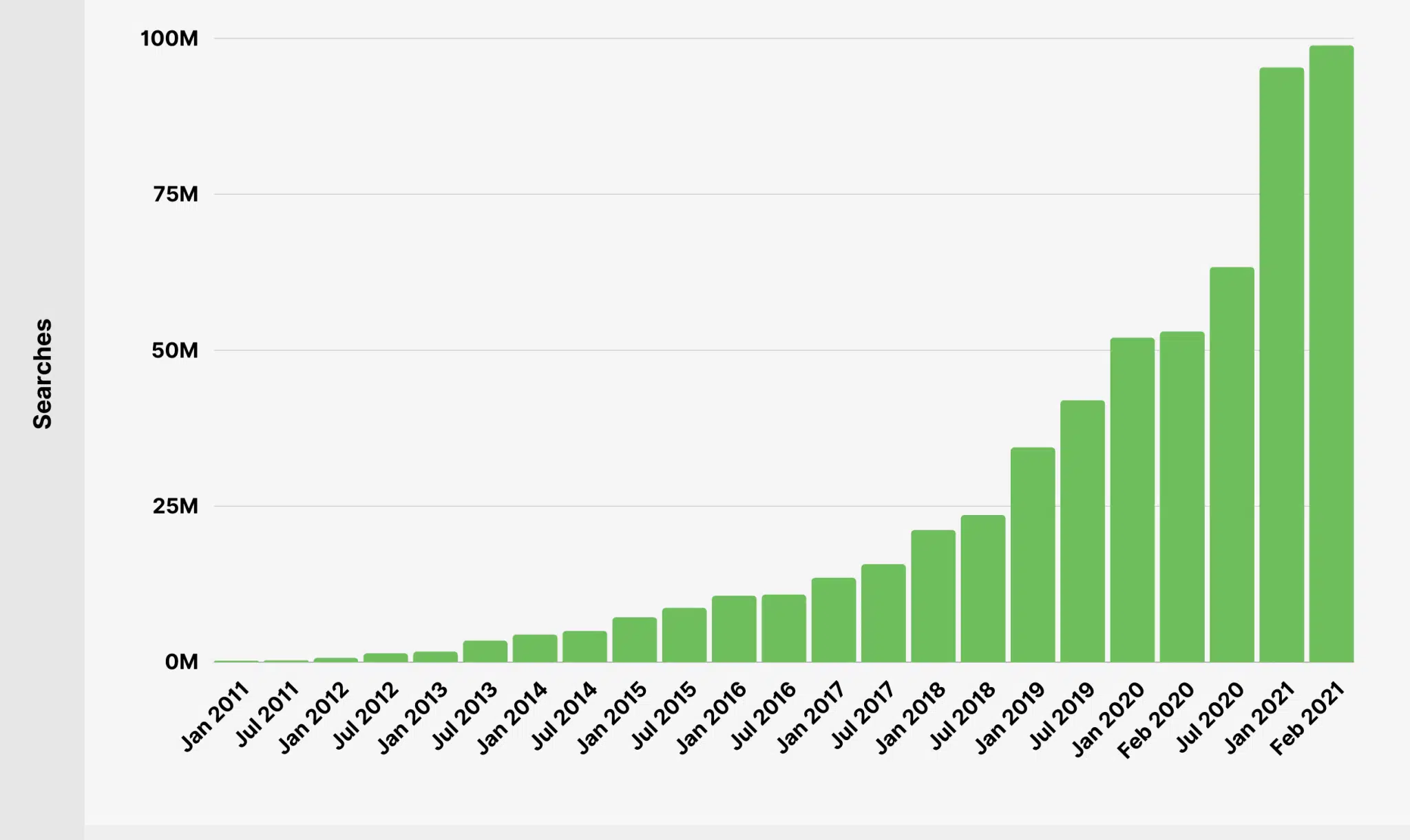If you’re in SEO or not, you’ve probably heard of and used Google. Everyone knows this search engine, so much so that its name has even entered the common language; we’re sure you’ve said “Google it” at some point.
If you’re in SEO, you probably watch for the Google updates with bated breath and optimise for this search engine. But did you know there are other search engines that people use? And if you want to do well in the SEO game, you should optimise for these alternative search engines and track the traffic from them, too. If you don’t, you could be ignoring potential users.
Some people are moving away from Google and using other search engines completely. It may only be a small percentage overall, but do you really want to discount these potential customers?
Why is Google the Dominant Search Engine?
According to Stat Counter, Google has a market share of 90.8%, though this has dropped from 93.11% last year.

Source: StatCounter Global Stats – Search Engine Market Share
Google owns 94.28% of the market share in the UK, and in the US, 87.14%.
In 2022, a study showed that Google conducted 8.5 billion searches per day! So, why is Google such a dominant search engine?
Sophisticated Algorithms
One thing that sets Google apart is its sophisticated algorithms. These algorithms prioritize the user’s experience. With over 200 ranking factors and complex formulas, Google aims to improve the individual’s search, ensuring that the user finds what they are after immediately and without having to scroll.
Constantly Changing
These algorithms don’t stay the same either. If you’re in SEO, you’ll know about Google algorithm updates (and the panic they can cause). There are significant updates that cause all the fuss, but Google has reported that its algorithms change hundreds of times a year. This means the results are constantly being updated and tweaked to make them the best result for the user.
Related: What to do if you’ve been affected by a Google Algorithm update
Sophisticated Crawling & Indexing
Google’s popularity is partly due to how it crawls and indexes web pages. It indexes billions of web pages quickly. The crawling system comprises bots (called spiders) that continuously scour the web, following links and gathering information. These bots are super-efficient, crawling millions of pages every single day. The algorithms also cause the bots to prioritise the most important and relevant pages so that users can access the most relevant and up-to-date information when they search.
Additional Features
Google doesn’t just list results; depending on the search, it offers a variety of features. These include maps, local results, information panels, People Also Ask, and more. These features can put information in front of a searcher without them even having to click on a result. These features aren’t just beneficial to the user either; they can make it easier for a business to appear high in the results (position 0).
Trust
An important reason that Google monopolises search is that the website has gained trust by building a reputation for delivering highly relevant results. No matter what you search, Google will give you relevant and up-to-date information.
It’s not just the relevancy of searches, though; it’s also the transparency that gains Google so much trust. Google has always been transparent about its algorithms and tries to ensure users can understand this. Well, they try to be transparent, but they never disclose the full picture. We all know that, in general, Google algorithms aim to make results as useful to the user as possible, but the specifics of how the algorithm functions aren’t fully shared. Google used to be more transparent, but that changed a few years ago. Despite this, we know the general aims of an algorithm update and can make informed guesses as to what each update is looking for. There are often leaks about changes, which can help you decide how to change your strategy.
Why Do People Use Alternative Search Engines?
So, if Google is so good and well-trusted, why would anyone use a different search engine?
The biggest criticisms users have of Google have to do with its safety and privacy. It’s well known that Google tracks data for its own use and third parties. Couple this with all the Google tools people can use, and you can see that the search engine can easily have a scary amount of data on you. For those that prioritise their privacy, this is a huge issue.
Other smaller issues that can cause people to move away from Google are aesthetics. For some people, the environmental impact is what causes them to move away, or they may just not like the fact that Google holds the monopoly.
Why Should You Optimise for Other Search Engines?
If Google dominates searches, should you care about the other 10% of the market share that other search engines share between them? The answer is yes! There are plenty of reasons why you should care about the different search engines, but it’s mainly:
- Potential Higher Rankings – Because of the different algorithms that alternative search engines use, you could rank much higher than you have the chance of on Google. If you struggle to rank on Google, you might get in front of users on other search engines. Or, you may even rank well on both, maximising your audience.
- Audience Preference – Although Google is popular, if your audience isn’t searching there, ranking well won’t lead to sales. Even if only a portion of your audience doesn’t search on Google, you don’t want to discount them. If your audience uses Yahoo Mail, for example, they likely use Yahoo to search at least some of the time. Not only that but if your audience is international, it’s feasible they use different search engines.
- Growing Market Share – As we’ve already seen, Google’s worldwide market share has declined slightly between May 2023 and May 2024. This means that as Google’s market share drops, other search engines have an increasing market share, which means they can give you more traffic. For instance, in the same time frame, Bing has gone from 2.77% to 3.72%. You don’t want to ignore a search engine that is growing in popularity! Even though the percentages are small, this is still a lot of people; 3% of 1 billion is still 30 million users!
Alternative Search Engines
There are a huge number of alternative search engines that people might use. Here are some of the most popular search engines other than Google:
Bing
Bing is the second most popular search engine, with 3.72% of the market share. Owned by Microsoft, this search engine’s algorithm is different from Google’s, as it uses traditional and social signals compared to Google’s 200 ranking factors.
Bing also has features, such as Bing Places, Bing Ads, and Bing Webmaster Tools, which you can use to improve your online presence.
A benefit of using Bing for users is its rewards program, where users accumulate points when they search. They can then redeem these points at the Microsoft and Windows stores. Some users also find the image search aesthetics much nicer than Google. Furthermore, when searching for videos, Bing lacks the YouTube bias that Google has.
Yandex
With 1.58% of the market share, Yandex is the third most popular search engine worldwide and holds the monopoly in Russia with 70.59% of the market share.
With various tools, such as maps, local search, and analytics, it is also a simple search engine. This search engine answers queries with the most current information, such as breaking news or the most recent post on X.
Yahoo!
Yahoo holds 1.19% of the worldwide search engine market share and has been evolving for over 20 years. This search engine’s strength is its diversification, as it offers services like email, news, and more.
Yahoo’s algorithms are similar to Google’s, but some differences exist. For instance, Yahoo emphasises the title tag and uses backlinks and on-page optimisation as ranking factors.
Baidu
Baidu is the most popular search engine in China, holding 52.15% of the market share. Worldwide, this search engine holds 0.92% of the market share.
Baidu offers a range of features, such as maps, video, and music. There’s also an app store and a mobile app. However, it’s important to remember that this search engine will censor search results in accordance with Chinese regulations.
DuckDuckGo
With 0.56% of the market share, DuckDuckGo might seem like a small search engine, but with its focus on privacy, it has been growing in popularity and is likely to continue to do so. The Tech Report shows that this search engine has been steadily growing in popularity and had an average of 99.7 million searches a day in 2022.

Unlike Google, DuckDuckGo doesn’t collect or store personal information, so users’ activity remains anonymous. This also means that DuckDuckGo doesn’t offer filter options based on previous searches and doesn’t offer targeted ads.
The Other 1.23%
The other 1.23% of the market is shared between various search engines. Although the percentage of the market share each search engine has is small, some are worth your attention:
- Ecosia – The search engine for the environment-focused searcher, 100% of its profits are dedicated to the planet, mainly through tree planting. This search engine partners with Bing to use its search index and web advertising.
- AOL—This was one of the first search engines on the Internet and is still used by some today. AOL leans towards curated content, prioritising news and entertainment. It relies on partnerships with Google and Bing for search results.
- Startpage – Like DuckDuckGo, this search engine does not track its users. However, it is a search engine aggregation and does not actually crawl the web itself. Instead, it fetches results from multiple search engines.
- Brave – Another search engine for the privacy-focused, Brave does not track its users. In 2023, this search engine achieved full independence and now operates on its own index. It also features free video calls, offline playlists and a customisable news feed.
There are many, many more search engines out there. Which ones you target will depend on where you can find your audience.
How to Target Other Search Engines
In good news, to target other search engines, you don’t have to do much different than when targeting Google. And you definitely don’t want to ignore Google’s Guidelines and always make sure you adhere to E-E-A-T principles. Just as when optimising for Google, you want to:
- Target relevant keywords
- Make the site useful for the user
- Gain relevant backlinks
However, you want to keep a few additional things in mind. Firstly, Bing considers your social media presence when deciding on rankings. So, social shares can improve your rank. This is something that isn’t a ranking factor on Google.
Related: How to create social shares
You also want to be aware that some search engines are powered by another. For instance, Ecosia is powered by Bing. Therefore, optimising for the parent search engine means you are optimising for all the search engines powered by it.
Some alternative search engines will have their own criteria, so research what they use to rank your site and work towards this. But be wary of prioritising an alternative search engine’s criteria if it could affect your Google ranking. Google still holds the lion’s share, so you don’t want to discount it when you target other search engines!
